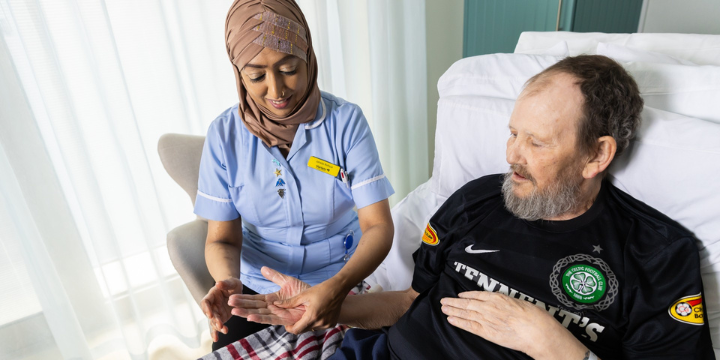Jaheda, a healthcare assistant working on our inpatient wards, explains how her recent pilgrimage to Mecca has given her a new perspective on her care work.
“In February, my husband and I went on an amazing journey together to Saudi Arabia to complete our first Umrah Haj (pilgrimage). We started off at Makkah (also known an Mecca), then we went to the Kabbah (this is the house where our beloved prophet Muhammad was born). I attended teachings on all faiths including the prophets Noah, Ibrahim, Moses, and Jesus, and the Prophet Muhammad.
A lot of this was new to me, as previously I didn’t follow the religion so strictly and wasn’t wearing a hijab. Finally, this year, after connecting more deeply with Islam, I felt I was ready to make the commitment to go. The pilgrimage helped prepare us for Ramadan, a festival observed by Muslims worldwide as a month of fasting (sawm), prayer (salah), reflection, and community. During Ramadan, Martlets has been flexible about letting me leave early to take part in prayers at home, which has been really important to me.
One of the most important messages of the pilgrimage was that in Islam we are all spiritually equal. No matter what their status in life was, or how rich or poor or famous people were, everyone was seen as equal in front of the Kabbah. Thousands of people walked around the Kabbah seven times at the same speed. The Kabbah itself was absolutely mesmerising. It was much larger than expected. Then we walked the Safa Marwa (mile long) seven times. It felt very powerful and freeing and was a humbling and beautiful experience that has given me a fresh approach to how I live and work.
I feel calmer since returning from the pilgrimage, and small things that might have annoyed me before don’t seem as important. The experience has helped me to be fully present to what really matters to me, and to the patients I’m looking after.
Terminal illness can affect anyone no matter what race, religion or social standing they have. Understanding that we are all spiritually equal means that every person deserves the same care and compassion.
A few days ago, one of our patients who is Hindu asked if I could read to her from the Bhagavad Gita, the holy book of Hinduism. That’s not my religion, but I was able to read it for her as I speak several languages, even though it wasn’t written in my mother tongue. I didn’t want to offend her by getting the chanting wrong as there is a certain way to say it out loud, but she said it didn’t matter to her that I was from a different faith and couldn’t speak it perfectly; she just wanted to feel the words and the deeper meaning. I have also read from the Bible to patients when they have requested it.
Recently, I looked after a patient who was from Israel. Even though she was Jewish and I am Muslim we got on really well. She saw me as an individual, a person caring for her, not as someone from an opposing faith. Her husband and I got on brilliantly because we’re both Arsenal supporters!
I think people probably thought ‘uh oh’, as given the tensions in the Middle East you might not have expected us to get along. But we got on so well that she even wanted to gift me her husband’s Arsenal memorabilia books that he’d brought in! It’s a safeguarding policy at Martlets that we don’t accept gifts from patients and families, unless it’s small things like sweets. Her husband was awesome and we read the books together when he visited and had some great football chats.
Now I’m wearing a hijab, I’ve generally had a positive reaction from staff, patients, and their families. Before I went on the pilgrimage, you wouldn’t have known that I was a practising Muslim, but now my colleagues have been quite intrigued with my change of dress. I was a bit wary in case some people felt uncomfortable, because sadly there are still people out there who associate Muslims with acts of terrorism. It’s important to understand that Islam is a peaceful faith; it is extremists who have associated Islam with violence.
My decision to go on the pilgrimage and to wear the hijab has felt important and connected me more deeply with the values of my faith. And that has made me more compassionate and understanding of the people I work with and care for.”
……………………
Did you know?
Ramadan is observed as the most sacred month of the year for Muslims around the world. It is a time of spiritual devotion and growth through fasting, prayer, reflection, charity, and time spent with family and loved ones. Ramadan marks the time when the Qur’an was revealed to the Prophet Muhammad. Muslims are encouraged to share their food with family, friends, and neighbours and to reach those who are alone in fasting. There is a special festival to mark the end of Ramadan. This is called Eid al-Fitr – the Festival of the Breaking of the Fast – this year celebrated on the evening of 10 April. It begins when the first sight of the new moon is seen in the sky. Muslims will not only celebrate the end of fasting, but will also thank Allah for the help and strength that they were given throughout the previous month.
How you can support Martlets:
Published 08/04/2024

